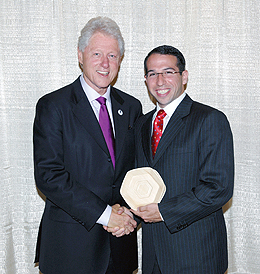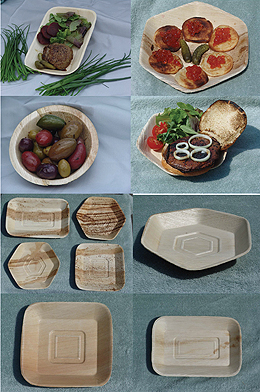ALUMNI UPDATES
Michael Dwork ’00 Makes Plates from Fallen Leaves
By Alia Malek ’06J


Michael Dwork ’00 with President Clinton — and one of his plates — at a fundraiser last June.
PHOTO: BEATRICE MORITZ PHOTOGRAPHY

Driving down a dirt road in rural India in summer 2006, Michael Dwork ’00,’07 Business spied something that would immediately change his life. There, by the side of the road, an impoverished woman sat pressing leaves soaked in water in what looked like a crude waffle iron. From its metallic jaws she pulled what appeared to be plates, on which she served the food she was selling.
Dwork asked his coworker, a local, what the woman was making, and he answered, “garbage.” When Dwork offered to purchase a plate, his colleague told him to “just take it.” In the end, Dwork paid a fraction of a rupee and came away with a few of the leaf plates.
The practical innovation, born from poverty, sparked Dwork’s entrepreneurial and capitalist imagination. “I just fell in love with them,” he says.
Plates made from nothing but leaves and steam that are then completely compostable enthralled Dwork not so much because he’s an environmentalist as much as that he hates to waste. It’s a trait he says he inherited from his mother’s family, Holocaust survivors who have always known how to make something out of nothing.
Dwork, then an associate at India InfoSys, used the remainder of his summer in between his first and second year at the Business School to improve the design and composition of the plates so they would appeal to wealthier consumers in the developed world interested in greener alternatives to plastic or paper dishes. He rented space in a factory the size of a four-car garage, hired 10 engineers and tasked them with figuring out how to make a more durable and more aesthetically pleasing version of the plates.
Dwork, meanwhile, secured deals with local farmers to provide him with fallen leaves that meet organic standards. In addition, not only are no leaves cut down for the plates, but the steam used is captured and reused. According to Dwork, making the plates uses less than a 10th of the electricity and water it takes to recycle a product.
The resulting plates are much sturdier than their ingredients would suggest, and an untrained eye might guess them to be made of bamboo or wicker.
At the end of that summer, Dwork returned to Columbia to finish his M.B.A.; he had liked the College so much, he says, that he wanted to return to Morningside Heights for graduate studies. At the B-School, while his classmates competed for lucrative offers from investment banks, hedge funds and the like, Dwork snuck away every month to India to supervise his business, unbeknownst to his family. He hadn’t told them — not because he was afraid they would be unsupportive, but in case they were too supportive.


The VerTerra plates, manufactured with steam and fallen leaves, look as if they’re made from bamboo.
PHOTO: MICHAEL DWORK ’00

“The great thing about America is everyone supports an entrepreneur, almost to a fault,” explains Dwork. “It derails lots of people who shouldn’t be entrepreneurs into becoming one.”
But by the time Dwork was ready to graduate, he got the kind of objective validation he could bank on. He took second prize, worth $100,000, in the Draper Fisher Jurvetson East Coast Venture Challenge and won the outrageous business plan competition at B-School.
“Almost any M.B.A. student from Columbia is bright and driven,” says Thatcher Bell, an associate at DFJ Gotham. “But an entrepreneur stands apart from most M.B.A. students; it’s an unusual type of person in the world. Michael was able to exhibit in a half-hour pitch that he was that type of person.”
Dwork’s new company, VerTerra (true to the Earth), was not even the first one he’d launched. After graduating from the College with a major in economics, and after working for three years in NYC in various financial roles, the lifetime New Yorker had moved to China. At Nanjing University, he studied Chinese as a full-time student for a year-and-a-half and took odd jobs such as running a bar and working for a German auto parts company to perfect his colloquial skills. In his spare time in China, Dwork started a business that offered translation and negotiation services for foreign companies. He sold it after matriculating to the B-School.
Since graduating last May, Dwork has thrown himself fully into launching VerTerra. The plates are currently selling to caterers and event planners; a pack of 12 medium-size plates goes for $5 through VerTerra.com (718-383-3333). Dwork recently completed his A-round of fundraising, which benefited greatly from his Columbia network; all investors are CC or B-School classmates.
Dwork continues to benefit from the Columbia campus. Even now that his offices are in Long Island City, he often chooses instead to go to the familiar and preferred rooms of Butler Library to work.
“It’s a strange thing to do,” he admits, “but sometimes going back to where you felt comfortable is important — it grounds you.”
Alia Malek ’06J is working on her first book, forthcoming in 2009 from Free Press, an imprint of Simon & Schuster. She is based in New York City.
|

